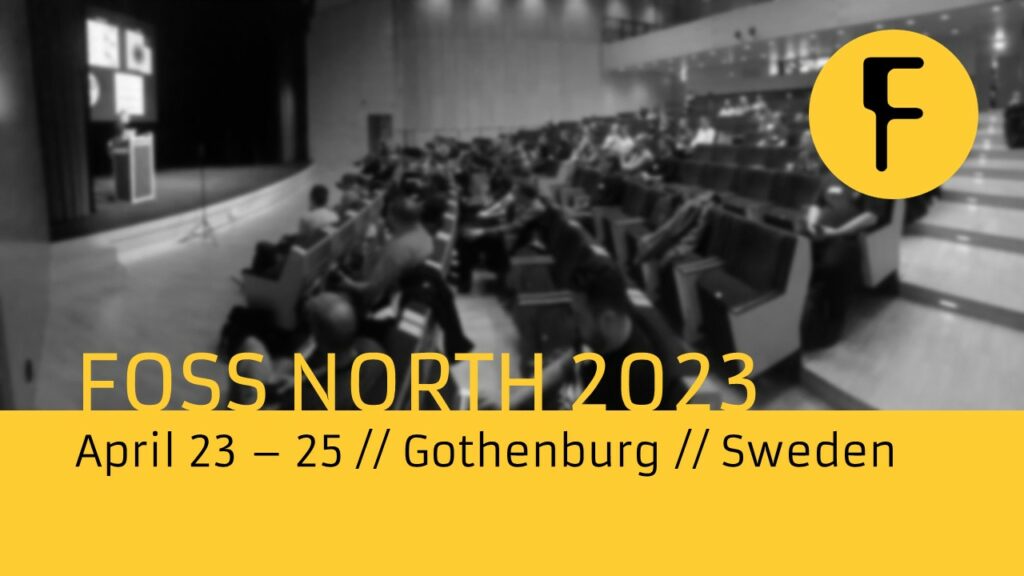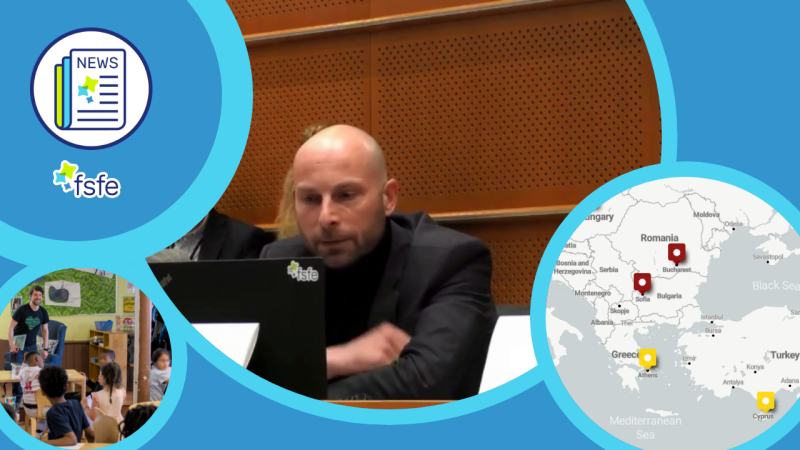Meet Andrei and David, two first edition YH4F participants
The coding period of the Youth Hacking 4 Freedom hacking contest has
been running for almost three months now. The
competition continues to be a fun contest for young hackers to
test and develop their skills. The previous edition
ended with 35 great projects submitted with inspiring stories
behind them. Read about Andrei's and David's projects.
The rules for the contest are simple: the projects must be Free Software. There are
no limits to the possibilities on the kinds of projects that can be
submitted. Any technical idea is welcome. This gives each
participant the chance to create a project according to their wishes,
skills, and interests. At the end of the first
edition of the Youth Hacking 4 Freedom
competition, 35 amazing projects had been submitted. Each of these
projects has an inspiring story behind it. Let us introduce you to two of these amazing
projects.
Take a look at Andrei's handy tool for dmenu and David's "OpenCV
Hand Gesture Control" project.
Before joining YH4F, Andrei was already involved in the Free Software world. He
has not only used various GNU/Linux distributions as his main operating
system, but also made sure it stays fun with games
available for everybody. He recently helped port Minetest (a Free Software game) to
the cross-platform library "Simple
DirectMedia Layer" (SDL), which helps developers to make sure their
games are working on different types of operating systems. But instead of
sticking to only a technical world Andrei channels his artistic
energy into both shell and film scripts.
The mind behind "OpenCV Hand Gesture Control" is David. David has a
passion for Free Software and software development. He
learned the basics of Scratch programming in Grade 3. Since then he has
improved his skills and widened his knowledge of programming. David
started writing scripts in Python and Bash and has now moved on to
learning Rust. After the YH4F contest David has also continued to work on
projects such as the Matrix-Modbot,
which is a bot that automatically moderates Matrix rooms.
FSFE: Hello
Andrei and David. Thank you for joining us.
FSFE: How did you
come into contact with programming and how did you learn to program?
David: When I
was in China, in grade 3 I was introduced to Scratch programming and
immediately became fond of it. Then I learned through experimenting
with the program to create simple animations and games. When I got
my first computer, I started to learn Python from a video series for
beginners. After learning the basics, I began to write some small
scripts in Python and Bash for myself. And last year, I managed to
secure an internship position at a software company. There I learned
a lot and this experience also led me to learning about python OOP
design and software design in general. Now I am learning Rust and
working on a project called Matrix-Modbot,
which is an automated bot for Matrix.
Andrei: I used
to go to a programming club a friend of mine invited me to. We were
writing C++ to solve some mathematical problems (things like
greatest common factor, factorial etc.) though we (unofficially)
spent too much time playing games there as well.
FSFE: Andrei, can
you tell us what was your first contact with Free Software?
Andrei: When I was
going through The Odin Project they required at some point to install a
derivative of Ubuntu (they said nearly half of software engineers use
it and it’s easier to install software and so on). I was convinced my
computer would stop booting but went along with it. Xubuntu installed
fine! Later on I learned all about the parts of the free GNU/Linux
operating system and how they work together so now I have started
writing package files (PKGBUILDs) on Arch so that I may too try and
contribute to this freeing ecosystem.
FSFE: Andrei, you have already
coded before and used Free Software in your daily life. What motivated you
to participate in the YH4F contest?
Andrei: I did not
know the FSF had an European sister organisation before and I was really
happy to get involved! I really liked the way the contest gives an
opportunity to choose a concrete, practical task and go through with it.
(Too often I get stuck halfway on coding a cool thing, and that’s not great.)
FSFE: David, what motivated you
to join the YH4F contest?
David: I saw the
advertisement on Mastodon and became interested in the competition,
so I joined and used my free time to work on the project.
FSFE: David, how
did you come up with your project idea to use your hand motion for
executing commands?
David: It
actually started while I was trying to read novels or to watch movies
on my laptop. When I read, I am usually in a relaxed position and I
find it cumbersome to reach for the mouse or the keyboard to turn
pages, so I thought: What if I can turn pages or pause the video with
the wave of my hand? And that is how I got my idea for the project.
David demonstrating his "OpenCV Hand Gesture Control" project.
FSFE: Andrei, could
you also give us an overview of your project
Andrei: I added
clipboard functionality to a dynamic menu program called bemenu.
Pressing ctrl-Y inserts the system clipboard into the command's
command buffer now.
FSFE: What
motivated you to work on your project?
David: It was
mainly to solve my own problem, and my program could also be used on
smart TVs or other devices with a camera to control the device
without using a keyboard or a controller.
Andrei: The bemenu project
is written in C, and it sounded nice to maybe learn to do some advanced tasks in
C like programmatically copying and pasting. That it would solve a practical
problem for me was a nice bonus too.
FSFE: Andrei, could you
briefly explain what a dynamic menu like bemenu is?
Andrei: A dynamic
menu takes in a list of things, for example some URLs, or some commands,
or usernames, and allows matching and selecting one of them. For example,
typing in fire or fox will match firefox but still allow selecting fire
or fox by itself. This means, for example, that finding and running a
command is made much easier. Think of it as a start menu, except one
that can be programmed to be taken into other programs, like for example
using it as a password prompt or a confirmation box. This works because
it always gives back the thing that was selected, and that can be used
by a different program.
FSFE: Did any of you encounter
any problems during the coding period or the building period?
David: I did
encounter many issues, and they were mostly some design flaws that I did
not anticipate. At that time I had little knowledge about software
design and was struggling to make the code clean and cohesive.
Andrei: It turns out
getting clipboard data is not the same everywhere! It is one thing on X11, and
a different thing on Wayland. At first, writing a clipboard manager myself
sounded fine (a likely story!), though eventually I decided on using
wl-clipboard and xclip. I am glad I learned to not be excessively afraid of
pulling in dependencies where it really solves a complex problem that writing
by hand would make little sense.
FSFE: David, can
every user define the shortcuts themself and do you have an example on
how your program works?
David: Yes, and
there is an example config file in the git repo of the OpenCV-Hand-Gesutre-Control.
For example three fingers to the right open a terminal window.
FSFE: How did you
train your tool to recognise your hand movements?
David: The hand
movement recognition is based off OpenCV, however I used a 3rd party
library to provide a trained model as implementing the same model myself
would be “reinventing the wheel”, but this time the wheel would probably
not spin as well.
FSFE: Andrei and David do you think you will
continue working on your project and what would be some next steps you would
like to realize?
Andrei: I think I am happy
with how the project is right now! They may say code never stops changing, but
when something is really finished that is great feeling. I’m sure I’ll be back
at it if something feels like it needs improvement though! My confidence is
certainly there now.
David: I think I
will work on the project in the future and re-factor the code as it is
currently quite messy and somewhat buggy. To make the detection more
accurate, I could use the power of python’s data science libraries to
make better sense of the input data.
FSFE: Thank you for
your time and we wish you both good luck with your next steps.
The coding period for the second edition of YH4F is still ongoing.
For more information about the contest please visit yh4f.org.
Support FSFE


 Author reading in Somerville MA, USA, a few weeks ago
Author reading in Somerville MA, USA, a few weeks ago

